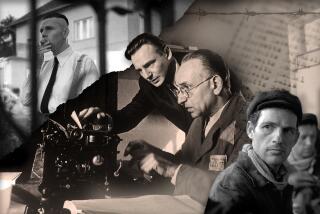Oratorio Raises Question of Moral Culpability in the Nazi Era
- Share via
I have rarely been as outraged by a piece of criticism as I was at Mark Swed’s review of the oratorio “A Child of Our Time” (“Daring to Ask the Big Questions,” Jan. 24). Whatever the merits of Michael Tippett as a composer and whatever the musical merits of the work, I would suggest that pacifism against the evils of the Nazis was not an act of “moral conscience” but rather an act of moral idiocy.
It is incomprehensible that anyone today could believe otherwise, yet Swed not only praises the “courage” of Tippett, who may very well be a great composer, but then goes on to denounce a truly inspired and moving work, “Schindler’s List,” as “Holocaust schlock.” Swed is certainly entitled to his opinion, no matter how misguided it may be, but it is obviously totally and completely wrong.
Swed states that Tippett wrote the oratorio based upon the incident that ostensibly provoked the infamous Kristallnacht, the horrible pogrom against the Jews of Germany in November 1938, and that Tippett believed that the violence of the Polish Jew Herschel Grynszpan, who killed a Nazi official, somehow begat the worse violence that followed. Any student of history knows that Kristallnacht was meticulously planned by the Nazis and awaited only an excuse, which just happened to be the actions of Grynszpan. It is as if Tippett was saying what so many of the Holocaust deniers say, that the Jews themselves, by their actions, brought about their own destruction.
So while Swed may believe that “issues of conscience are a low priority among orchestra audiences,” it is obvious that they are a high priority, and the failure of the public to turn out for the concert and the poor playing of the orchestra were merely a reflection of their quite correct moral revulsion to such a work and its composer.
H. JAMES ROSENBERG
Van Nuys
More to Read
The biggest entertainment stories
Get our big stories about Hollywood, film, television, music, arts, culture and more right in your inbox as soon as they publish.
You may occasionally receive promotional content from the Los Angeles Times.










